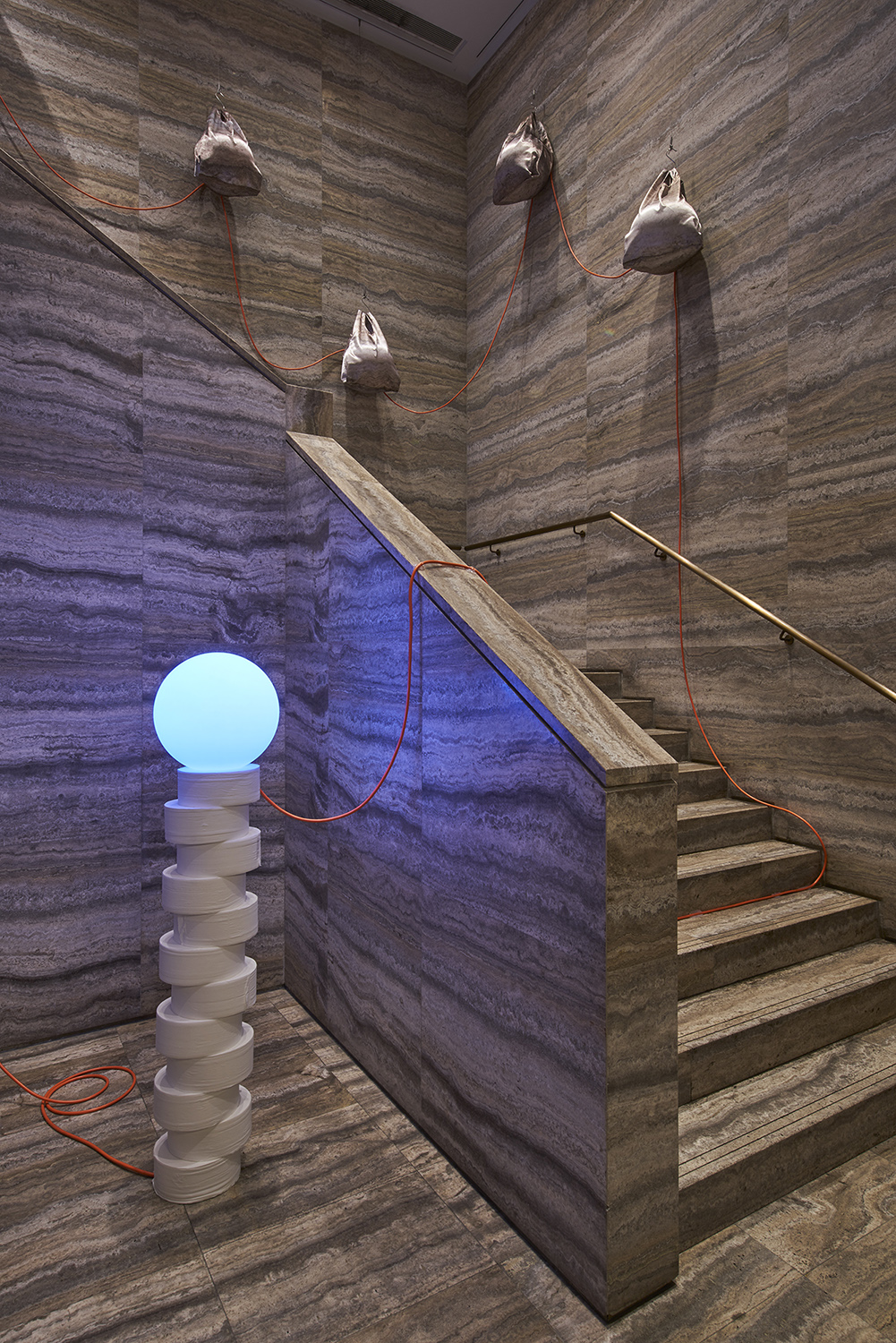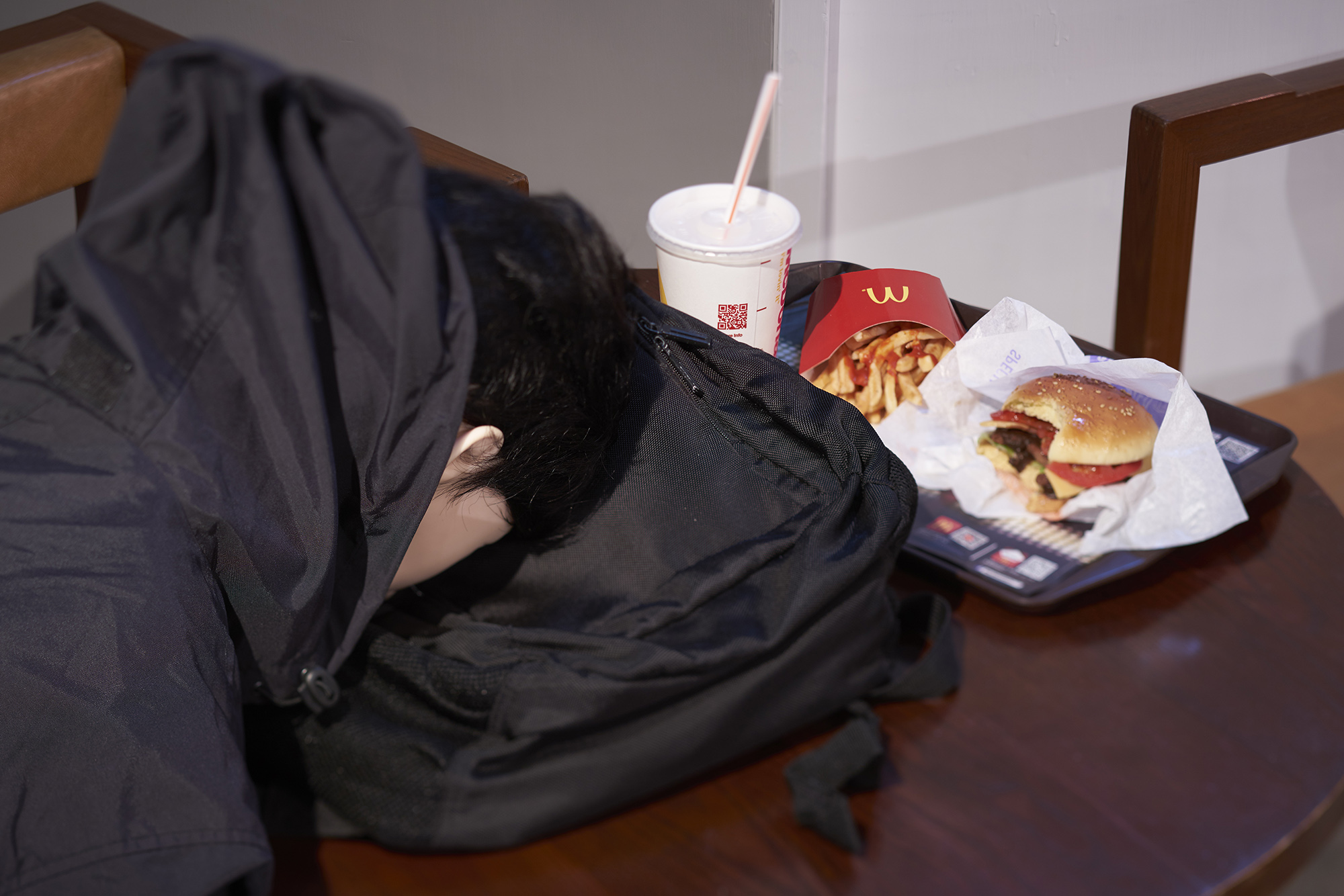Shows
“The Day the Gods Stop Laughing”


A fluorescent blue spherical lamp is supported by a stack of toilet paper rolls, standing stubbornly by the stairs leading up to the Duddell’s restaurant—a bizarre but intriguing contrast to the venue’s sleekly designed interiors. An orange wire connects the lamp to a set of gold-colored reusable shopping bags hung along the walls by the stairs. These common household objects disrupt the site’s deliberate sophistication with their ordinariness, symbolizing the repetitive, mundane and unglamorous aspects of life.

This strange arrangement comprises Doreen Chan’s installation He Is Alright (all works 2018), part of Duddell’s latest exhibition, “The Day the Gods Stop Laughing.” Curated by Yuan Fuca, the show invited four Chinese artists to create “independent yet intertwined narratives and situations within the subliminal states of the site,” employing visual and audio elements to situate the audience within various imagined scenarios. According to the curatorial statement, the show’s grouping of unconnected narratives embodied Carl Jung’s concept of “synchronicity”—a series of meaningful but causally unconnected coincidences.
The idea of recreating a scene most palpably materialized in Silas Fong’s Enjoy Your Meal! Entering the members-only library, one may be shocked at the sight of a homeless man in a black hoodie bent over a table in the corner, a partly eaten McDonald’s meal left on a tray in front of him. This hyperreal sculpture comments on a pressing social issue in Hong Kong, colloquially known as the “McRefugee” phenomenon—homeless people seeking shelter at McDonald’s. Fong’s recreation of this scenario in a high-end establishment like Duddell’s is reminiscent of Mark Rothko’s aim to “ruin the appetite” of diners with his Seagram Murals, originally commissioned in 1959 for the Four Seasons’ restaurant in New York. Enjoy Your Meal! is a poignant reminder of the deep socio-economic disparity in Hong Kong aimed directly at Duddell’s VIPs, forcing them to reflect on their social responsibilities.

In an alcove in the dining area outside the library, Tap Chan’s Entanglement presents subtler social critique. Affixed to the back wall of the alcove are two rectangular, symmetrically aligned cushions in aqua velvet fabric recalling an old-fashioned sofa, with hair-like, silver nylon fiber sprouting out of them. Holographic, semi-transparent screens are pasted onto the glass panes adjacent to the wall, while rainbows are projected onto the two blue cushions—shaped like windows with faux-stone frames—hung on the two walls at the entrance to the alcove. The rainbow motif is a reference to Stanley Kubrick’s 1999 thriller Eyes Wide Shut, in which “where the rainbow ends” is a euphemism for the debauched underground gatherings attended by the rich and powerful. Chan’s work implies that Duddell’s is similarly a place “where the rainbow ends,” only available to the upper class and hidden from the outside world.
Among the chatter of diners, in a corner of the restaurant, one may pick up the intermittent whispers of three women recounting their misfortunes. Guangzhou artist Ye Hui’s audio installation The Waiting Room presents the stories of three characters of different races and time periods, each having murdered her partner. On the wall, a color-print photo depicts the room where the women had possibly sat and talked, furnished with a potted plant and four chairs, one of which is lying awkwardly on the floor. Above the chairs is a board that reads, “BLACK woman dismembers disabled WHITE man.” Alternating between miserable sighs about their experiences of domestic abuse to unremorseful accounts of their crimes, the dialogue between the women reflects the media’s (and the public’s) polarized and gendered perceptions of violent female criminals as victims and attackers, and highlights a marginalized group that would have no place in an establishment like Duddell’s.
“The Day the Gods Stop Laughing” presented a group of site-specific works that all seemed to incorporate some form of commentary on social inequality, the impact of which was heightened by the prestigious venue itself. Ironically but unsurprisingly, the curatorial statement refrains from making any explicit comment on class. In leaving the socio-political themes of these works a “coincidence,” it was doubtful that the show would register as meaningful for Duddell’s high-end clientele, its message lost among the dishes and wine.

Pamela Wong is an editorial intern of ArtAsiaPacific.
“The Day the Gods Stop Laughing” is on view at Duddell’s, Hong Kong, until September 23, 2018.







